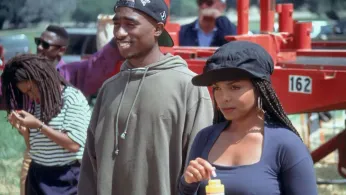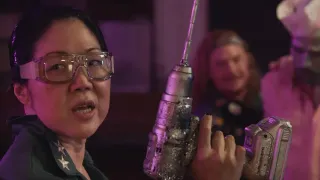
4 hours ago
Janet Jackson’s Request for Tupac to Take AIDS Test Before 'Poetic Justice' Kiss Revealed in New Biography
READ TIME: 3 MIN.
In an excerpt from the much-anticipated biography "Only God Can Judge Me" by Jeff Pearlman, a behind-the-scenes moment from the making of the 1993 film "Poetic Justice" has reemerged, offering a window into the anxieties and realities of Hollywood’s relationship with the HIV/AIDS epidemic. According to the book, Janet Jackson, the film’s co-star and pop icon, requested that Tupac Shakur undergo an AIDS test before they performed their on-screen kiss, citing his reputation as a “cat about town” . This request, as recalled by the film’s producer, both highlights the personal stakes for actors in intimate scenes and reflects broader societal fears prevalent at the time.
The early 1990s were a period of heightened awareness and anxiety about HIV/AIDS, particularly in the entertainment industry, which had lost many prominent figures to the disease. While public health campaigns had made significant progress in dispelling myths about transmission, stigma and misinformation were still widespread. Hollywood productions, especially those involving romantic scenes, often faced heightened scrutiny regarding health and safety protocols .
Janet Jackson’s reported insistence on an AIDS test for Tupac was not without precedent. During this era, similar concerns led to changes in how intimacy was depicted on screen, and some productions required assurances of actors’ health status before filming physical contact. The request, as reported in Pearlman’s biography, was described as “blunt,” reflecting the frankness with which such matters were sometimes discussed behind closed doors .
Tupac Shakur’s reputation as a charismatic and controversial figure was well established by the time "Poetic Justice" was filmed. Known for his activism, artistry, and turbulent personal life, Tupac was both celebrated and scrutinized in public discourse. The characterization of him as a “cat about town” referred to his perceived lifestyle and relationships, which, in the context of the era, could fuel concerns about sexually transmitted infections, including HIV .
The biography draws upon nearly seven hundred interviews, presenting a nuanced portrait of Tupac that goes beyond tabloid headlines to capture the complexities of his life and the environments in which he operated . The revelation about the AIDS test request is one among many details that highlight the interplay between public persona, private realities, and the pressures faced by Black artists and entertainers in a changing America.
Despite initial tension, both Jackson and Shakur completed their roles in "Poetic Justice," delivering performances that would become iconic in American cinema. The film itself, directed by John Singleton, broke new ground by centering Black love, creativity, and vulnerability, themes often underrepresented in mainstream media at the time .
The AIDS test anecdote, as reported in "Only God Can Judge Me," also serves as a reminder of the evolution of conversations about sexual health, privacy, and workplace safety in entertainment. Today, the entertainment industry has established more robust protocols regarding health disclosures, consent, and intimacy coordination, reflecting both medical advancements and changing attitudes about HIV/AIDS .
For LGBTQ+ communities, the 1990s were a critical period of advocacy against the stigma surrounding HIV/AIDS. The entertainment industry’s response to the epidemic often mirrored broader societal challenges, including discrimination and the policing of sexuality—issues that disproportionately affected gay, bisexual, transgender, and nonbinary people. The public nature of Janet Jackson’s request, as recounted in the biography, underscores how fear and misinformation could influence even high-profile interactions, reinforcing the need for education and empathy .
At the same time, the increased visibility of such conversations helped pave the way for more open dialogue about HIV prevention, testing, and the rights of people living with HIV/AIDS. Contemporary advocacy emphasizes the importance of combating stigma through inclusive, affirming language and policies. The lessons from the past, including moments like the one described in Only God Can Judge Me, continue to inform ongoing efforts to create safe and supportive environments for all—including LGBTQ+ actors and professionals working in film and media .
The rediscovery of this behind-the-scenes story adds another layer to the legacies of both Tupac Shakur and Janet Jackson. For many, it is a reminder of the progress made in sexual health awareness, the importance of consent and communication in professional settings, and the ongoing struggle against HIV/AIDS stigma. As Only God Can Judge Me makes clear, the lives of cultural icons are shaped by the challenges and conversations of their times. By revisiting these moments with nuance and context, we are better equipped to understand—and to honor—the complexities of those who changed the world through their art, advocacy, and authenticity .






